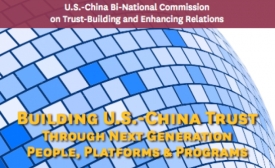china

The U.S.-China Bi-National Commission releases its first major report: Building U.S.-China Trust Through Next Generation People, Platforms, and Programs.
The news that the ABC is to establish an ‘online portal’ in China that will allow it to ‘represent and sell media content across China’ has been greeted with understandable enthusiasm by the ABC.
As languages go, English is a notoriously promiscuous one, borrowing caricatures from Italian, chutzpah from Yiddish and faux pas from French. And yet despite the English-speaking world’s deep and wide confluences with Chinese culture, for some reason, few Chinese words have lately entered the English-speaking world’s vocabulary.
Internationally, the 2010 Shanghai World Expo was a major tourism and branding draw card for its host city. Domestically, the Expo constituted a major source of national pride and a key vehicle for the promotion of official messages reinforcing traditional state propaganda themes.

Pad Chinese doesn't have the same ring to it, but it might be a bit more accurate. Pad Thai, the now-ubiquitous noodle dish made with chewy, stir-fried rice noodles, vegetables, bean sprouts, peanuts, and egg, among other things, is so popular it’s become the de facto measure by which Thai restaurants in New York, London, and other storefronts around the world are judged.
From territorial disputes in two of Asia's major seas to the nuclear crisis in North Korea, Chinese and US officials have exchanged sharp words - a trend that analysts say has heightened China's frustration over what it perceives as intensifying efforts to contain its rise.
Russia’s Foreign Minister, Sergey Lavrov, was in China Tuesday. During his visit, Lavrov held meetings with Chinese Foreign Minister Wang Yi as well as President Xi Jinping. According to a Chinese Foreign Ministry spokesperson, Lavrov’s visit was primarily designed to “lay the groundwork” for President Vladimir Putin’s scheduled visit to China in May.








